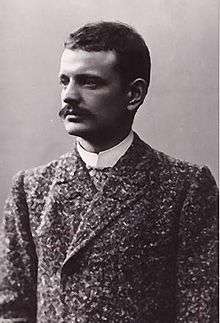Kullervo (Sibelius)
Kullervo, Op. 7, is a suite of symphonic movements by the Finnish composer Jean Sibelius. Although often called a choral symphony, the work avoids traditional symphonic structure and its five movements constitute a set of related but independent tone poems. The third and fifth movements make use of a men's chorus. The third, authorized by the composer for performance as an independent work, also calls for two soloists, a baritone and a mezzo-soprano.[1] Based on the character of Kullervo in Elias Lönnrot's epic poem Kalevala and using texts from that poem, the work premiered to critical acclaim on 28 April 1892[1] with Emmy Achté and Abraham Ojanperä as soloists and the composer conducting the chorus and orchestra of the Helsinki Orchestra Society, which was founded in that year.

History
Kullervo had only four more performances in Sibelius's lifetime, the last on 12 March 1893. He refused to publish it until, in 1957 at the very end of his life, after reorchestrating the final "lament" section of the third movement, he gave permission for it to be published after his death.[2]
Though the work was generally well received, Sibelius's idiosyncratic style received some criticism. Greater controversy arose from the fact that he set a Finnish text. Finland was divided between Swedish nationalists, the Svecomans, and promoters of Finnish (Suomi) language and culture, the Fennomans. The Svecomans regarded Sibelius, whose mother tongue was Swedish, as a defector.[1]
Isolated movements were performed during Sibelius's lifetime. The fourth was performed two days after the premiere and again in 1905 and in 1955. The third was presented as part of the centenary celebration of the publication of "Kalevala" in 1935 and in 1958, a year after Sibelius's death, with Jussi Jalas, Sibelius's son-in-law, conducting. A limited edition release of the 1958 Jalas live performance became available in the early 1970s. The first studio recording was made by Paavo Berglund and Bournemouth Symphony Orchestra in 1971. Since then many orchestras have performed and recorded the work. The first complete performance in the United States was given in Milwaukee with the Milwaukee Symphony Orchestra under Kenneth Schermerhorn.
Structure
Each of the five movements presents a part of Kullervo's life, based on the Kullervo cycle from the Kalevala. Movements one, two, and four are instrumental. The third and fifth contain sung dialogue from the epic poem. The work runs over an hour. Some recent recordings range from 70-80 minutes.
- 1. Introduction
This movement evokes the heroic sweep of the legendary Finnish setting, as well as the character Kullervo, a complex, tragic figure.
- 2. Kullervo's Youth
This movement reflects the somber tone of Runos 31 through 33 of the Kalevala. Kullervo is marked for tragedy from birth, and spends his youth largely in slavery.
- 3. Kullervo and His Sister
The baritone and mezzo-soprano represent the protagonist and his sister, while the male chorus sets the scene and offers commentary. Kullervo encounters three women and unsuccessfully attempts to seduce them, before succeeding with the third, only to realize too late that she is his long-lost sister. When she learns the truth, she leaps into a stream and drowns. Kullervo laments his crime and his sister's death.
- 4. Kullervo Goes to Battle
Kullervo attempts to atone for his crime by seeking death on the battlefield.
- 5. Kullervo's Death
A haunting male chorus recounts Kullervo's death. He inadvertently comes to the site where he raped his sister, marked by dead grass and bare earth where nature refuses to renew itself. He addresses his sword, asking if it is willing to drink guilty blood. The sword answers, and Kullervo falls on his sword.
Discography
- 2015: Sakari Oramo, BBC Symphony Orchestra, BBC Symphony Chorus, Polytech Choir, Johanna Rusanen-Kartano, Waltteri Torikka, (BBC Music Magazine BBCMM413) Live recording at the BBC Proms August 29, 2015
References
- Sirén, Vesa (principal editor); et al. (2005-07-03). "Jean Sibelius, The Music – Kullervo". The Sibelius Project. Retrieved 2012-10-16.
- Jean Sibelius: Kullervo, Op. 7, 1st edition, 1961: Breitkopf & Härtel, Wiesbaden. Facsimile printing of copyist's MS; Citations refer to the Editor's Preface.
- https://www.discogs.com/Sibelius-Marianna-R%C3%B8rholm-Jorma-HynninenHelsinki-University-Chorus-YL-Los-Angeles-Philharmonic-Esa-/release/7129928
- https://www.chandos.net/products/catalogue/CHAN%209393
- https://www.chandos.net/products/catalogue/LS%200074